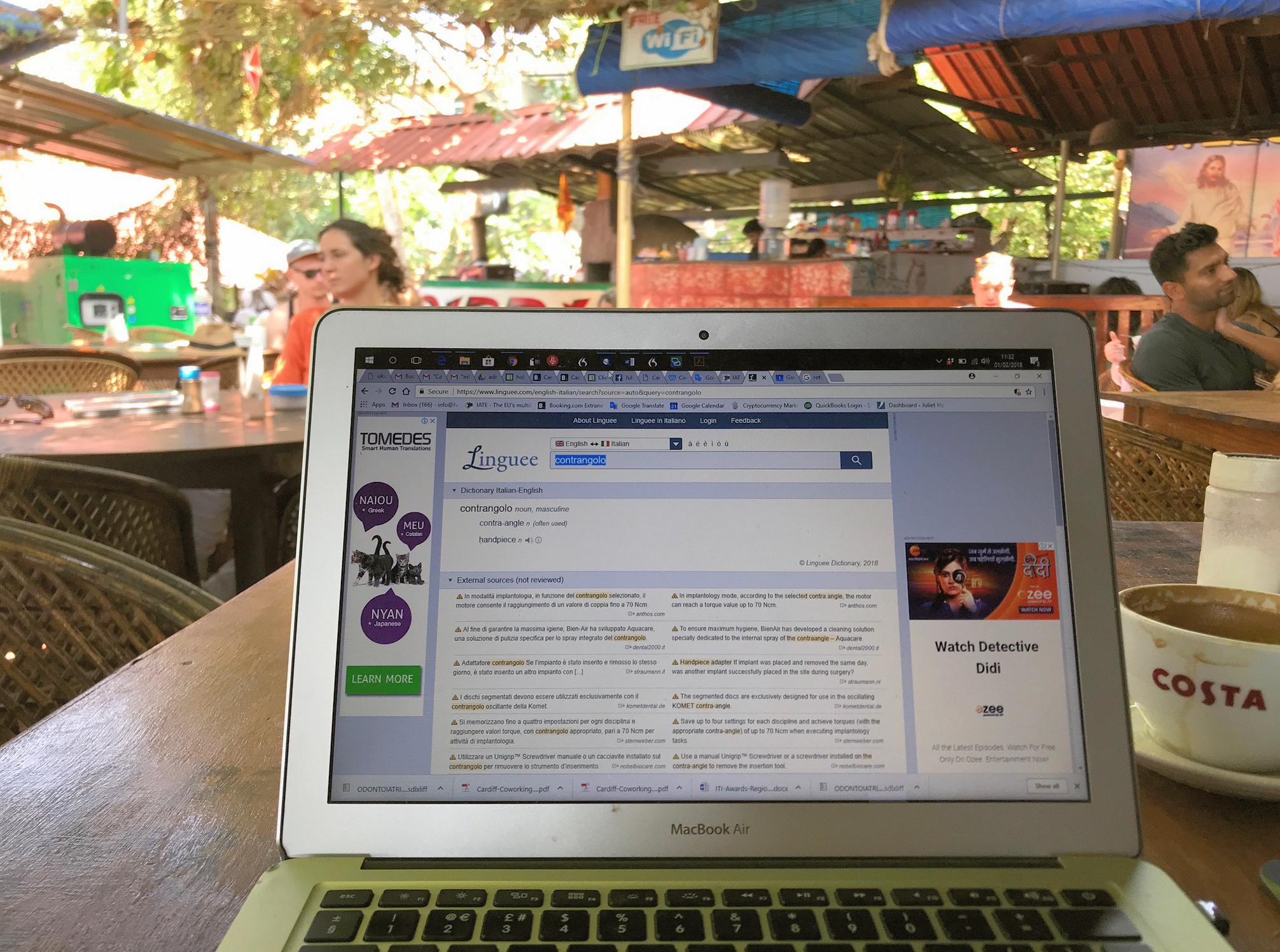
I’ve spent periods abroad in Italy and Spain working away from my home office since the 1990s. It’s a way of getting to spend longer abroad than I would be able to just by going on holiday – and I can only spend so much time lying on a beach or sightseeing. Now I have a house in Italy, I spend about a third of the year working from there. I’m not unique: loads of translators do the same thing. But this seasonal working break abroad is more transhumance than nomadism. A couple of years ago, I went to Thailand for a few weeks, got a bit bored, was broke when I got back and resolved that the next time I went on a long-haul trip to a hot country in the European winter, I’d take my laptop, stay for longer, earn some cash and have a go at being a digital nomad.
My first attempt was a trip to Kerala in India in January and February this year. At the same time, fellow translator, traveller and part-time digital nomad Aina Cartagena (www.laportablava.com/en/) has been living and working in the digital nomads’ Mecca of Chiang Mai, Thailand. She’s still there at the time of writing and has kindly offered to add her experiences to this blog entry.
Juliet’s Kerala trip
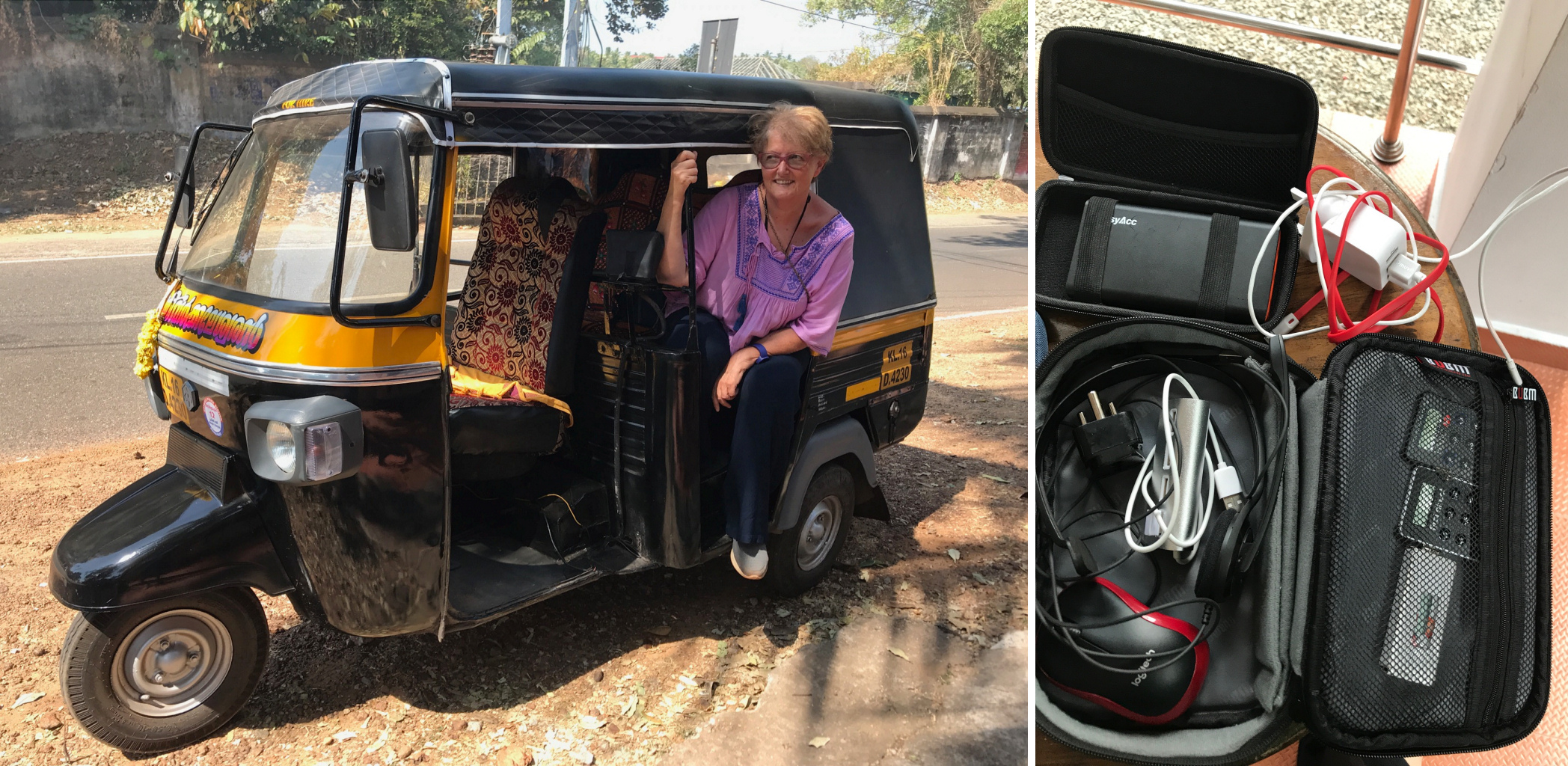
I planned my trip to India carefully so I didn’t carry too much weight. In the end, my checked-in bag weighed just 12.5 kg (a personal best!) and my rucksack must have been about 6 kg.
Where I worked
In my room when I need privacy to dictate (I use Dragon Dictate) or on café tables. Anywhere with a flat surface and WiFi connection really.
What I took
Work-related:
- MacBook Air running Windows and all my usual programs including DropBox for cloud backups and synching with my desktop when I got back home
- Headset for dictating
- Wireless mouse & mousepad
- 4-port USB extension and card-reader (didn’t use those)
- Home banking gadgets
- Power pack for recharging
- Chargers (check them carefully before you set out to make sure there’s no fraying or kinking – I had to traipse around in Goa to find a new charger and it wasn’t like popping into Dixons!)
- Indian plug adaptors
- Business cards – you never know who you might run into. A business card scanner app like Camcard is a good idea too.
- Indian SIM card – very cheap for a lot of inclusive minutes, texts and GBs
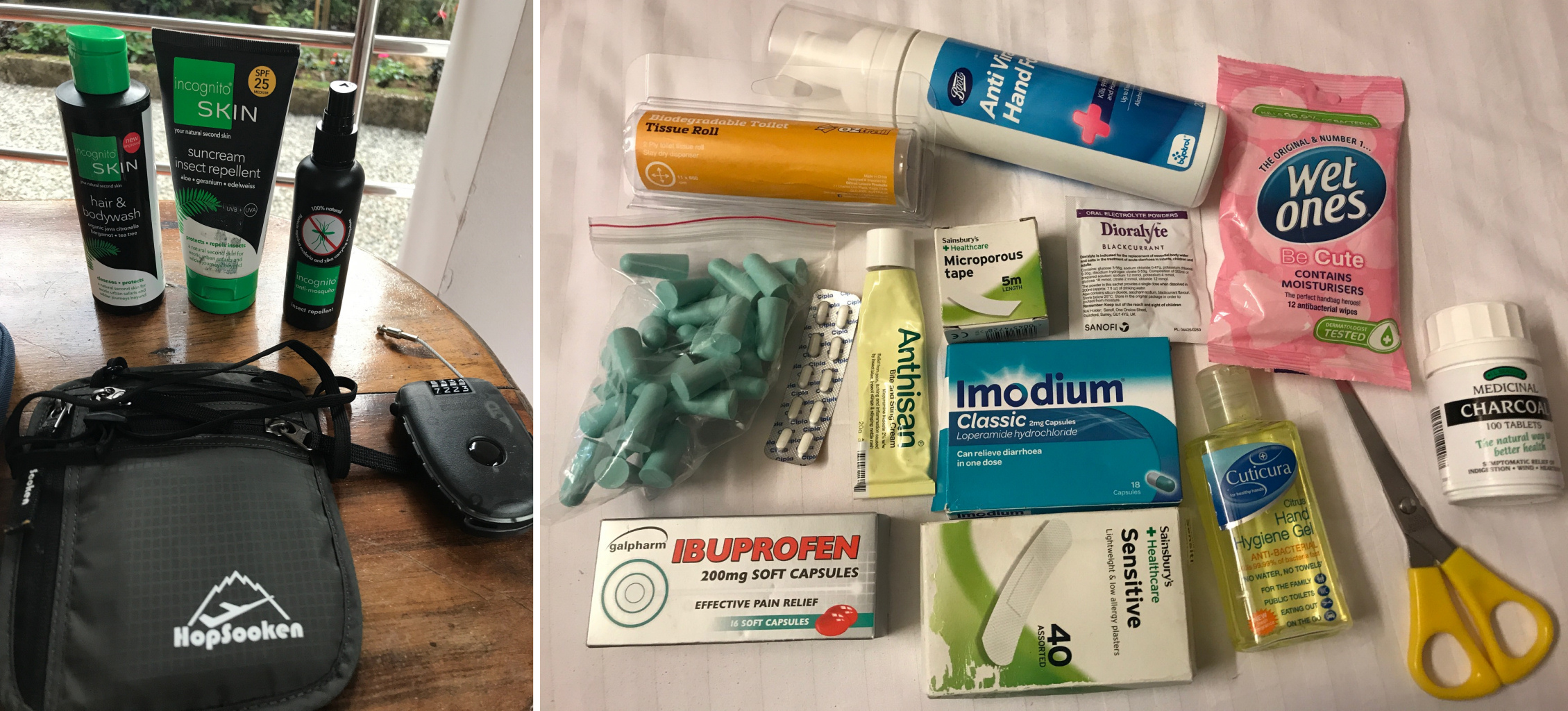
Personal:
- Kindle
- Travel pouch with RFID blocking for passport etc.
- Money: Revolut card (app-based pre-paid card with free ATM withdrawals, instant currency conversion, ability to hold multiple currencies and loads of other benefits), plus a conventional credit card (Halifax Clarity is best) and debit card as back-ups. I also had some cash in £ sterling: ATMs can be few and far between and sometimes don’t work. They also work using magstripe (not chip and pin) technology, making it easier for your card to be cloned. Strictly speaking, you’re not supposed to take rupees in and out of India. Only a few specialist currency exchanges allow you to buy them before you travel. Although the Travelex desk at Heathrow wouldn’t let me preorder rupees online, they did sell me a few at an extortionate rate (about 66 rupees per £) when I turned up in person. The best rate I got in India was 89 rupees per £ (January 2018) on my Revolut card.
- Mosquitos: I bought in a plug-in diffuser as soon as I arrived and took an array of Incognito products that you can buy online as well as in Holland & Barrett and Waitrose. I find it as good as DEET and it’s all natural and doesn’t melt plastic in that disconcerting way DEET does. I also use Incognito spray in Italy where the mosquitos mean business. The ones in India were pussies by comparison.
- Bike lock: the expanding cable lock type. This was brilliant for locking my case to something solid on trains and in waiting rooms. I also used it instead of the padlock some homestays provided as a room lock.
- Ultra-light down jacket – as it’s only really useful on the plane and travelling to and from Heathrow, you need something that packs down to nothing and is feather-light so you can carry it around the rest of the time.
- Preventing and treating Delhi Belly: antibacterial and antiviral handwashes, Imodium, medicinal charcoal and Dioralyte sachets – proud to say I didn’t catch anything this trip though.
- Itches, allergies and so on: antihistamine ointment (mosquito bites) and tablets. Take them with you from home! I developed a nasty contact allergy to the sheets and blankets on overnight train trips and had to suffer for a few days because I didn’t trust the strip of unpackaged antihistamine tablets I was offered at the pharmacy.
- Ear plugs
- Toilet matters. NB, don’t read this bit if it’s too much information! I’m a big fan of the douches plumbed into every Indian (and Thai toilet) and used them whenever I could instead of toilet paper. Otherwise, travel toilet paper was handy and I used my shewee when I didn’t fancy squatting down on train loos.
- Lightweight travel towel
- Travel neck cushion
- Last but not least … scissors: you need them all the time.
What I forgot
- Swiss army knife
- Portable speakers
… and what I had to do without:
- Printer – you can get by with split screen display and I could even have used an iPad as a second screen. If I’d really need to, I could have got documents printed at an internet café.
- Scanner – when I go for longer trips to Italy I take my beloved portable Doxie scanner.
Would I be a digital nomad again in India? I’d prefer to have been working in a place where more people were doing the same thing as me – co-working in fact. Kerala was full of Marigold Hotel types and I sometimes felt slightly awkward working away on my laptop while everyone else was relaxing. Apart from that, the whole experience was really positive, I met loads of lovely people, saw lots of incredible sights. I missed out on the worst of the British winter and earned some money while saving on my heating bill at home and spending very little: I struggled to spend £20 a day over and above my accommodation – often I spent as little as £5 a day.
Aina’s Chiang Mai trip
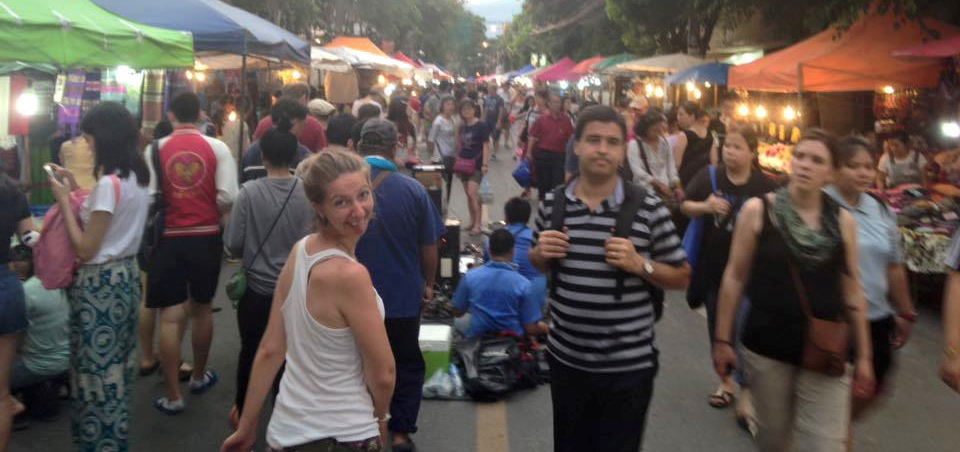
I have been doing the “digital nomad thing” since 2015, and I have been living and working in Thailand, Morocco and Sri Lanka. I am currently in Chiang Mai, as it is a perfect city to enjoy yourself while still translating. I have been here for around two months now, and I must say it is almost perfect. Unlike Juliet, this time I have stuffed my suitcase as never before: I know Chiang Mai pretty well, and I know that I won’t be travelling a lot, so I took advantage of it and brought 20 kilos plus the rucksack with all the tech stuff. I usually travel with a 7-8 kilo backpack, but I’ve gotten to a point where I want to have more “decent” outfits to wear and feel “like a person”.
Where I work
I usually work in my apartment, but I also spend time in many of the local cafés and restaurants around here. It is really worth working in these places because there are plenty of them, they’re beautiful and Wi-Fi connections are great!
What I took
Work-related:
- Cell phone (I just can’t live without it).
- Laptop with Windows with MS Office, MemoQ and Adobe Photoshop and InDesign.
- Wireless mouse.
- 160 GB external hard drive.
- 2 pen drives.
- Power pack for recharging.
- Chargers.
- Business cards. I also take advantage of being here and I usually get some more printed.
- Tablet (I use it as a second screen).
- Pens, pencils, post-its.
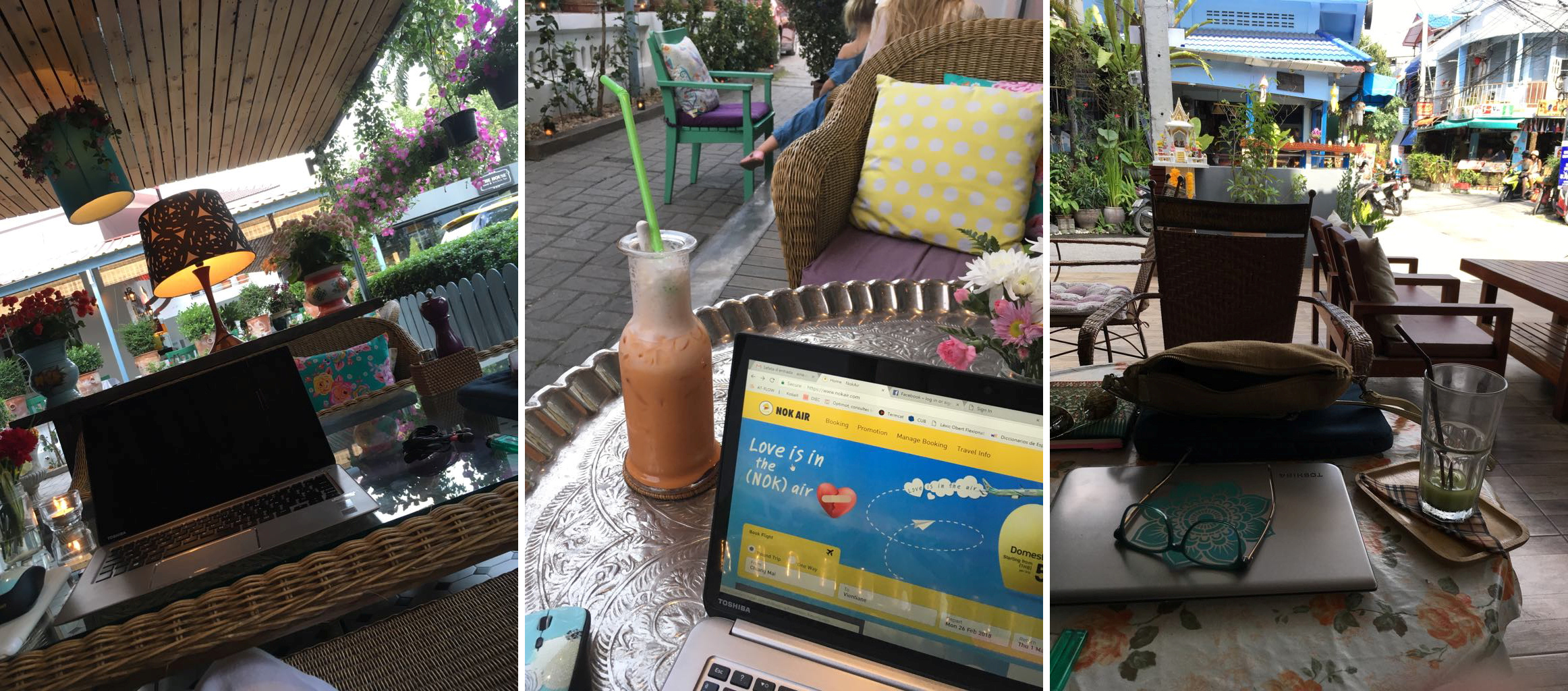
Personal:
- Money: I usually travel with cash in Euros and I change as I need in my trusted exchange places. I also carry both a debit and a credit card for emergencies and on-line purchases (Mastercard). There are ATMs everywhere here, so there isn’t any problem if I have to use them, but bank fees (both from my bank and the Thai bank) are a bugger, so I try not to use them at all. Personal note: I will really have to check the Revolut card!
- Mosquitos: I get a natural spray here to keep them away. I also use incense and candles in the room (apart from the mosquito nets you have in every window and door).
- Security: Chiang Mai is a really safe place, nothing compared to Sri Lanka, India or Morocco. Here you can leave your laptop on the table while you go to the toilet and it will still be there when you’re back. When I go to not so safe places, I carry a PacSafe bag protector. Very useful and light.
- Polar jacket for the plane.
- First aid kid: including oral rehydration solutions (I tend to forget drinking water).
- Itches, allergies and so on: nothing. If needed, there are plenty of pharmacies here where you can get pretty much anything. Plus the people running them are all sweet and helpful.
- Toilet matters: I just carry a packet of Kleenex and that’s pretty much it. I also like to use the douches. Excuse me for the expression, but they are sooo refreshing!
- Swiss knife. I don’t leave my home without it. I bought it for protection when I first went to Morocco by myself. Then I realised that I probably wouldn’t know how to use it against an attacker, but I found so many other practical uses for it that I am willing to check-in baggage just for the sake of having it with me.
- Notebooks: one for the expenses and another one for notes and reflections.
- Others: a yoga mat and a good camera.
What I forgot
- One of the good things about Thailand is that we have this amazing invention called 7/11. You can get anything you can imagine here, from tweezers to headphones. So, if you’re going to Thailand and forget something, don’t worry about it, 7/11 is the solution (and quite inexpensive, too!).
… and what I had to do without:
- Second screen: I usually work with two 24 inches screens. Here I just have to do with my laptop’s screen and the tablet as a secondary when really needed.
- I also have to do without the printer and the scanner, but I don’t really use them back home, either, so it is not a problem for me.
Do I recommend being a digital nomad in Thailand? Fuck, yeah! Thailand is a very rich country in culture and has very nice weather (I run away from the winter as well). Plus it is very easy to travel: safe, well organised and with very fast Wi-Fi. Also, here in Chiang Mai there are many other people working and enjoying: if you don’t feel like being on your own all the time, it is relatively easy to find nice co-working spaces and make friends with other freelancers. Last, but not least, life here can be really cheap and your quality of life can be better than at home: eat out every day, massages, fruit shakes, nice coffee, visiting markets, sightseeing when you’re tired of working, and so on. Overall, it is quite perfect to be here.
Conclusion:
It’s definitely fun, doable and worthwhile, but could be best to seek out a digital nomads’ community where you are more likely to meet like-minded people
